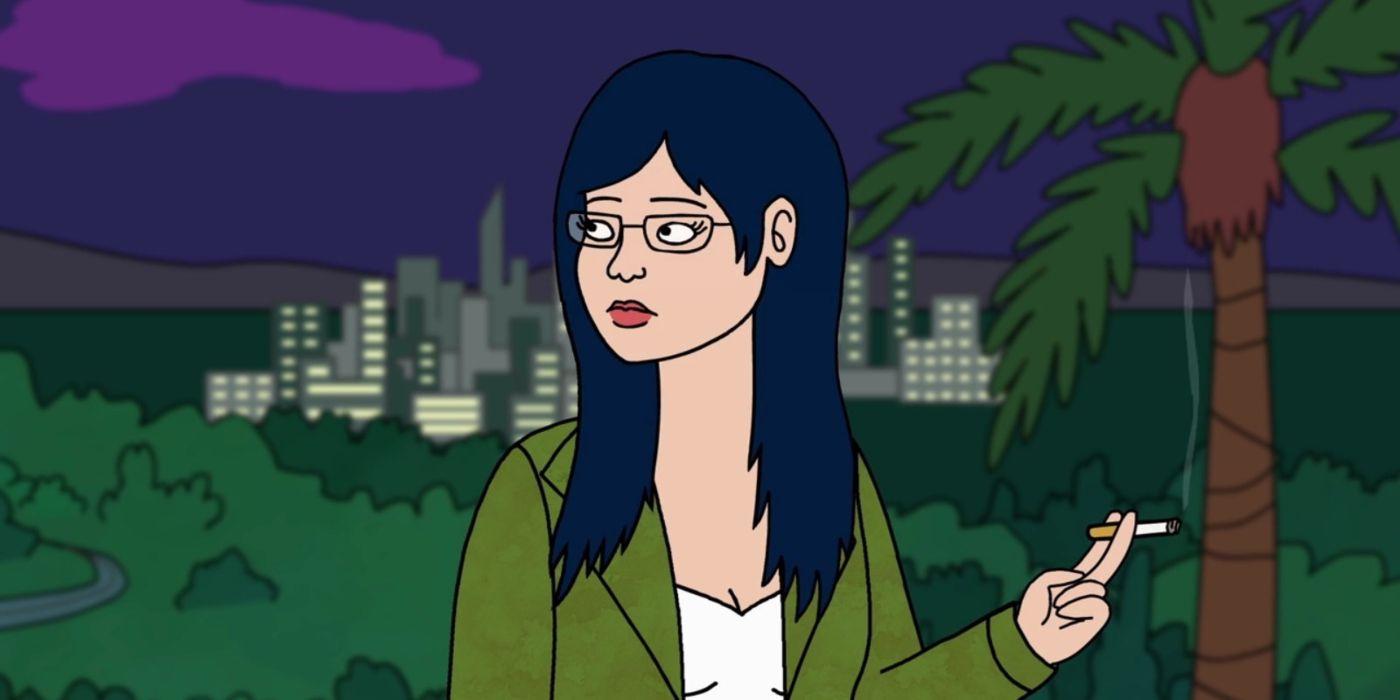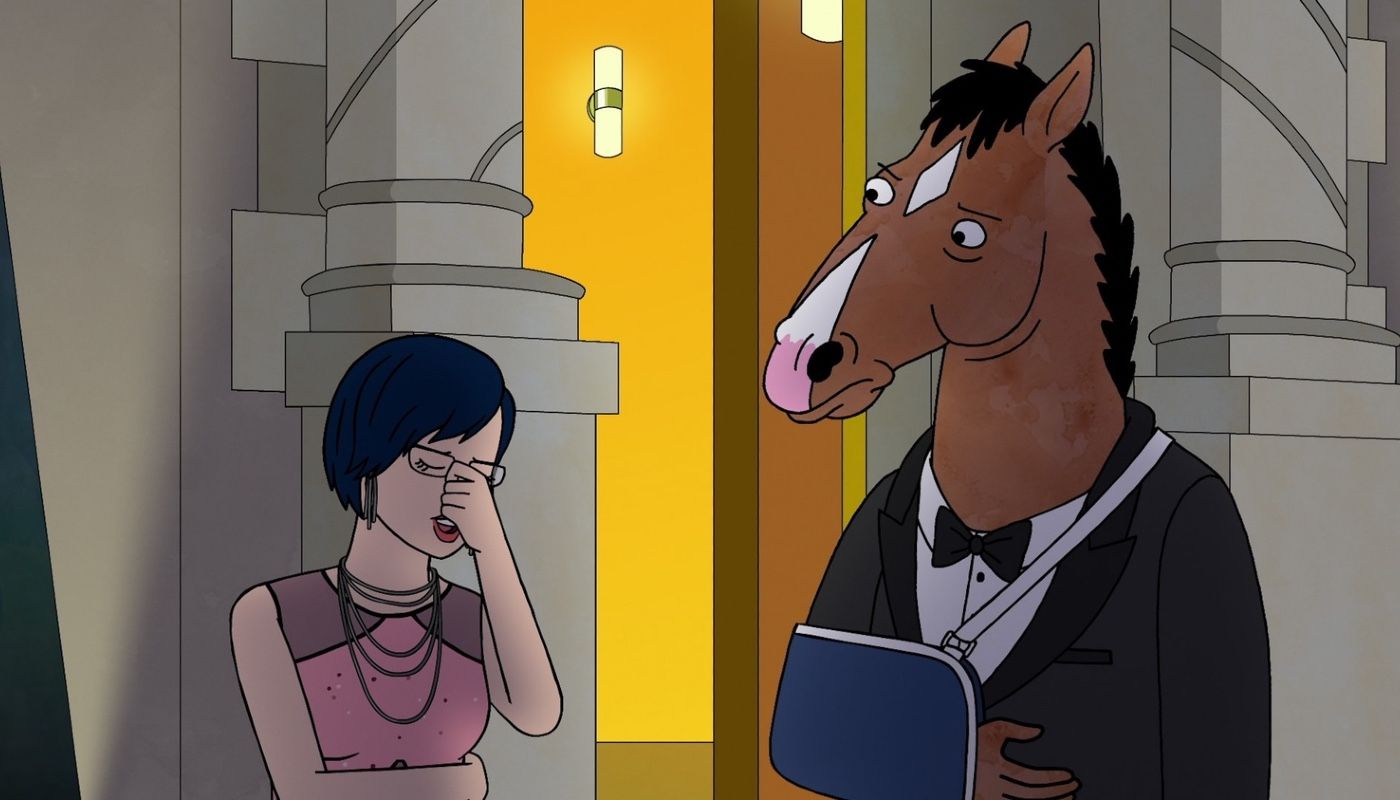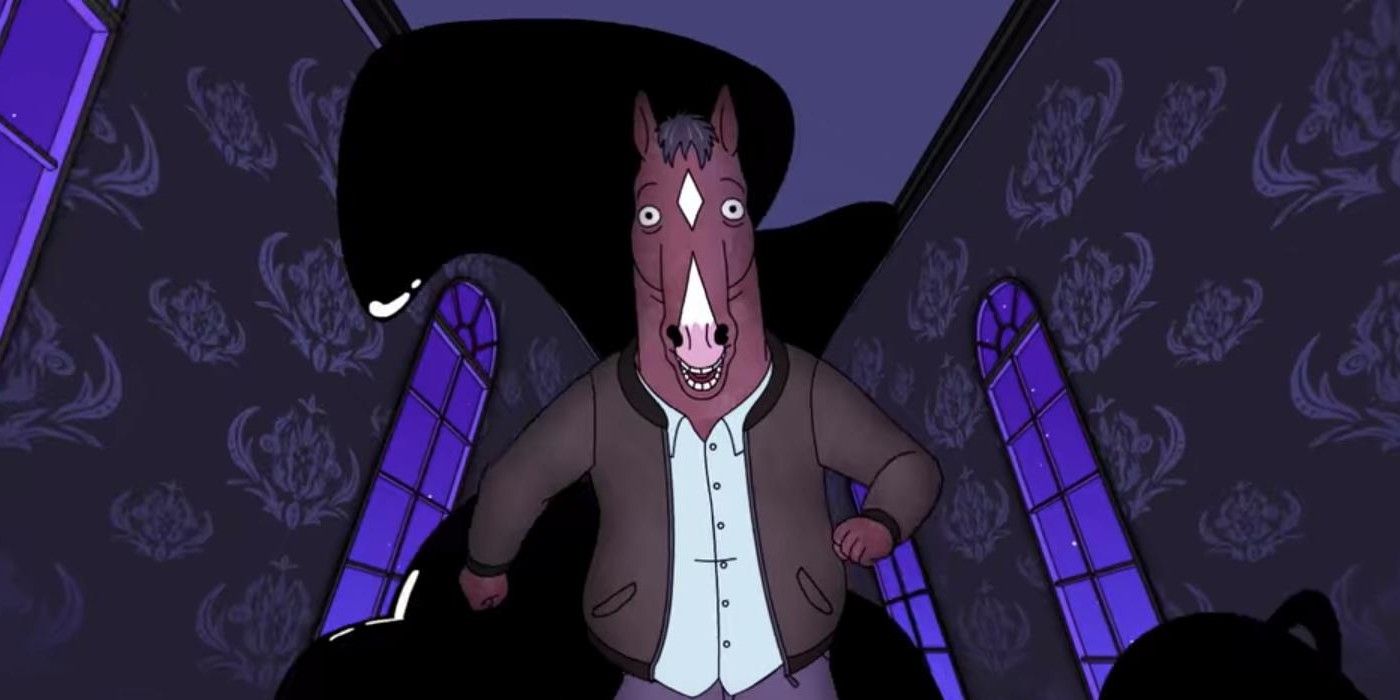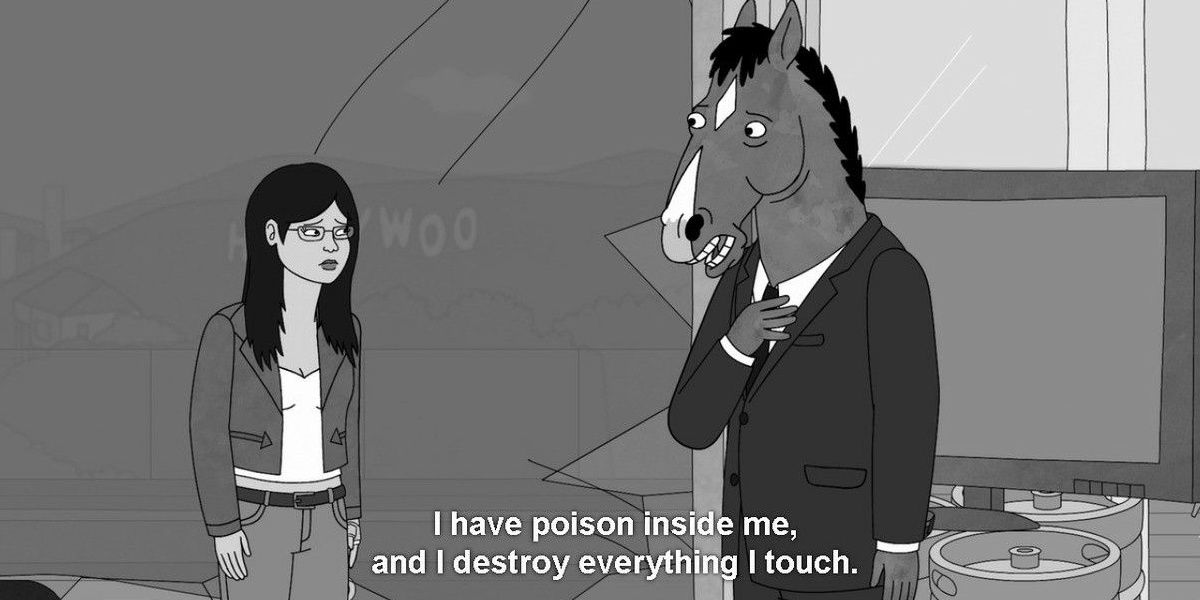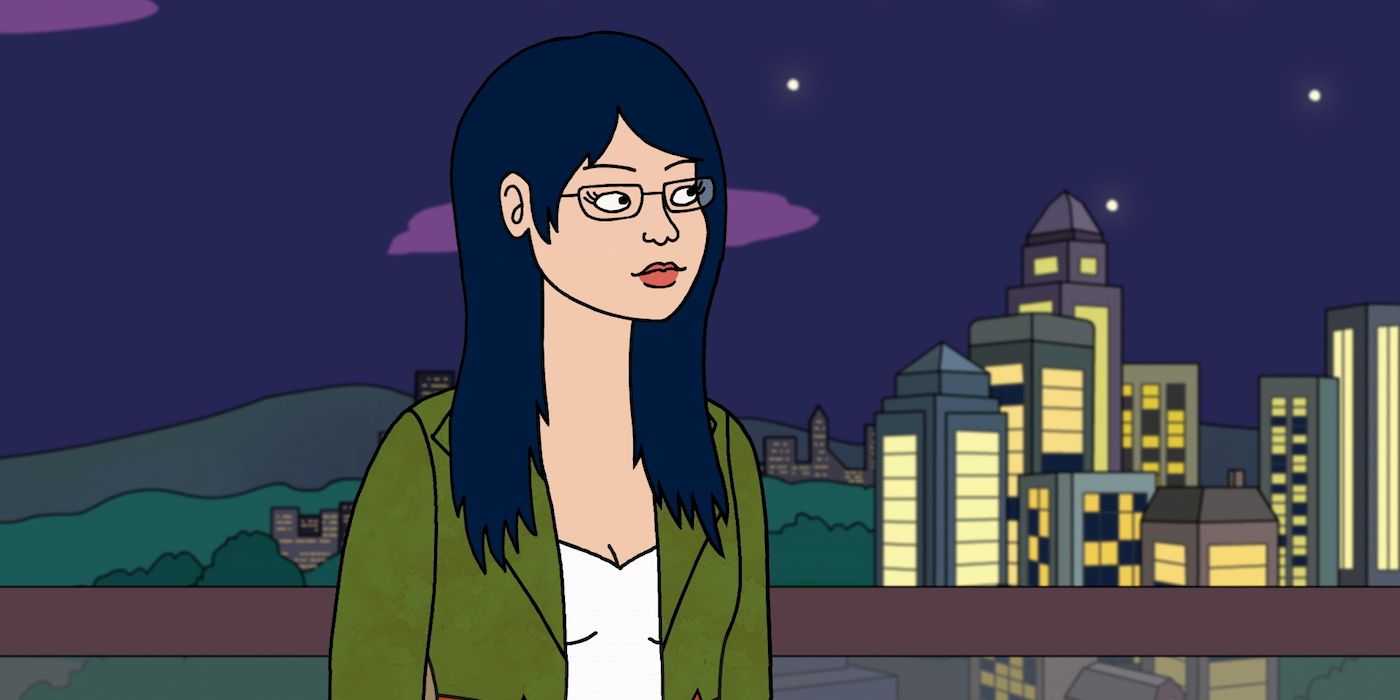BoJack Horseman Season 6 episode "The Face of Depression" confronted something that fans of the show had known for a while -- that Diane was and is incredibly depressed -- and genuinely depicted what it was like for someone to realize this truth.
In the episode, Diane wrestles with that hard truth, saying, "OK, I've been a little depressed, but I'm not like depressed. I don't have depression." The word depression rings out with a note of defeat -- as if by just saying the word, she has somehow lost a battle with herself. I recognized that tone because it's one I've used many, many times before as well. It's the sound of someone suffering from a mental illness while still wanting to conquer it, struggling to isolate the illness from the individual, the feelings of the disease from the authentic feelings towards one's self.
It's maddening. It's yelling in an echo chamber only to have all your sharpened anger richoted right back at you. It has everything and nothing to do with you. You know the story you tell yourself about yourself isn't true, but you cannot stop the telling.
I could not stop it. Diane could not stop it either.
What's beautiful about Bojack Horseman is that "The Face of Depression" creates a way to illustrate (literally) what this conversation feels like in Diane's head. We're brought into her thoughts, drawn in a black and white cartoon world where all the people that hurt her live, still voicing their disappointments of her -- Mr. Peanut Butter, BoJack and her abusive and neglectful father.
We see what she cannot express to her partner Guy when he voices concern about her mental state. We understand that this pain is Diane's view of what's normal and something she relives every day. In her mind, her head is drawn much smaller than her mental demons, and we feel how this disease controls her like a possession. However, she doesn't ask for help until Guy and BoJack point out to her that she seems to be suffering more lately and maybe she should consider taking the anti-depressants that were prescribed to her. Guy points out that she's been smoking three packs a day and wearing the same PJ's for weeks, while BoJack notices that her apartment is full of trash and hears in her voice a kind of panic.
Initially, Diane refuses. Her reasons for not taking medication range from the superficial to a deep concern that she's beyond help. She tells Guy that when she was on meds before they made her "so calm and boring... And Dawson's Creek got bad!" She got acne, gained weight and felt less creative. She also confesses, "What if you leave and come back to this person you don't even recognize?" To which Guy replies deftly, "I don't even recognize you now."
To BoJack, Diane asks, "What if you just flip over the nothing and underneath there's more nothing and more nothing under that?" Diane is both fearful that the medication won't work and she'll still suffer, and that if it does work, she will struggle to be herself.
Eventually, she relents and starts taking medication in a later episode, "Good Damage." Until watching this episode, I wasn't on medication for my depression. I heard Diane's fears in "The Face of Depression" as all legitimate woes and reasons to not seek additional treatment. Like Diane, I'm a writer. Like Diane, I've had my unfair share of trauma. Like Diane, I thought, "My best stuff comes out when I hate myself." Why in the world would I want to challenge myself when history has shown me that I cannot win this? I cannot escape myself. This is just how it is, how I am, who I am. Similar to Diane's work at the fictional "Girl Croosh" site -- where she delved into the painful injustices of the world -- I received attention and compliments for personal essays I wrote about my pain. I pushed myself further into this direction during my time in my MFA program that sought to see more of this "challenging" work, despite its emotional cost.
When Diane begins medication, at first, her quality of life improves. While she's still sardonic and yelling about the plastic forks given out in a baseball stadium with a Chicago-style baked potato, she can also laugh at herself for getting so upset over little things. We see in a lively montage brief moments of her encountering frustration -- like not being able to get a beer in a bar -- and instead of falling into a spiral, she rises above the moment and asks for help. Guy has not left her. She leaves her apartment and dresses. However, she finds some drawbacks to the medicated version of herself. Although BoJack Horseman shows all the good medication can bring, it doesn't shy away from depicting its realistic side effects.
As Diane predicted, she gains weight, which frustrates her when trying on clothes, as she's not sure what size to buy anymore. Her six-month-overdue book of personal essays isn't being written, and she tells Guy she's easily distracted now when trying to write about her painful past. When she tries writing her book, the colorful world of Ivy Tran's Food Court Detective instead blooms in her head. She builds this fun, YA-story about a Vietnamese-American teenage girl solving mysteries at the mall and dealing with being a teenager. However, this frustrates her, as she's always understood herself as someone who'd write deep, emotional essays that other girls could relate to and feel less alone. She tells Guy, "I can't even access my damage... I need to get to a dark place."
When I was adjusting to medication, I too felt the fog that Diane mentions and the genuine boredom to linger in sad moments. Although it was easy pre-meds to fixate and obsess and circle back to harmful moments -- which can look a lot like writing and revision -- it suddenly seemed not fun to do and my mind would drift away to something else. However, it didn't scare me when it happened because I saw Diane go on a similar journey. It prepared me for the truth that sometimes what we really value when we were depressed won't matter as much when we're stable.
This change scares Diane.
Despite Guy's pleas, Diane stops taking her medication. Quickly, the black and white voices return. They tell her, "Your damage isn't interesting and you're unworthy of love." Diane starts vomiting from stopping her medication incorrectly and spontaneously crying, calling herself stupid. Guy reassures her she is not stupid, tells her to take her medication to even out so she can stop withdrawal symptoms, and that together they'll find a better solution.
While harrowing to watch, Bojack Horseman's including Diane's decision to spontaneously take herself off meds is critical to include. Those who begin medication for depression often wind up in a place where the medication is working, they feel fine, and so it seems like the best time to just stop taking meds. Sometimes, and under direct doctor supervision, it can be. Or, the medication isn't working that great and could be better but it isn't too bad. The show demonstrates how without support, taking yourself off medication that's needed is incredibly harmful. However, it shows the viewer that that thought -- or even action -- is also incredibly normal. Although it's not explicitly stated in the show, the moment acknowledges that when starting medication, it can take time to find the right one and the right dosage. It is a process that only works if you're honest about how it's affecting you to yourself and those -- like Guy -- that support you.
Eventually, Diane lets go of writing her memoir. In doing so, she lets go of holding on to her painful past. "It means all the damage I went through was for nothing," she says. "I spent all those years being miserable for nothing." It doesn't wholly mean nothing for Diane. Through these statements, BoJack Horseman is honestly portraying what happens when someone becomes mentally stable and looks back at how they acted while suffering from depression. It's normal to judge yourself, to blame yourself or others when you reach a level of stability that you have never felt before. Like Diane, it can be hard to process that there's been a huge chunk of time that you've been sick. But, the show demonstrates through Diane and her successful YA series, her second husband Guy and her new relationship with herself -- as opposed to L.A. Diane -- that there's so much more time ahead to get to know yourself outside your depression, and sometimes that self requires medication to get there, and that -- and you -- are perfectly OK.
And if you are not OK, there are resources out there to help. All it takes is to ask for help. I did. And while it's not easy to tumble out the other side of the rabbit hole, it certainly beats feeling like nothing you do matters. Everything you do or don't do matters.
Isn't that what BoJack asks of all of us to learn?

